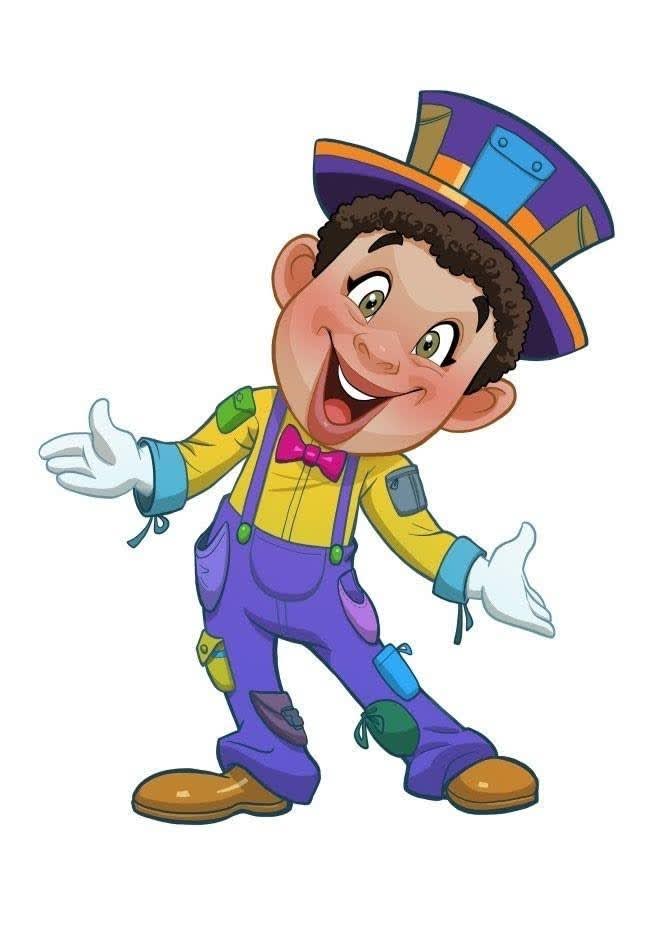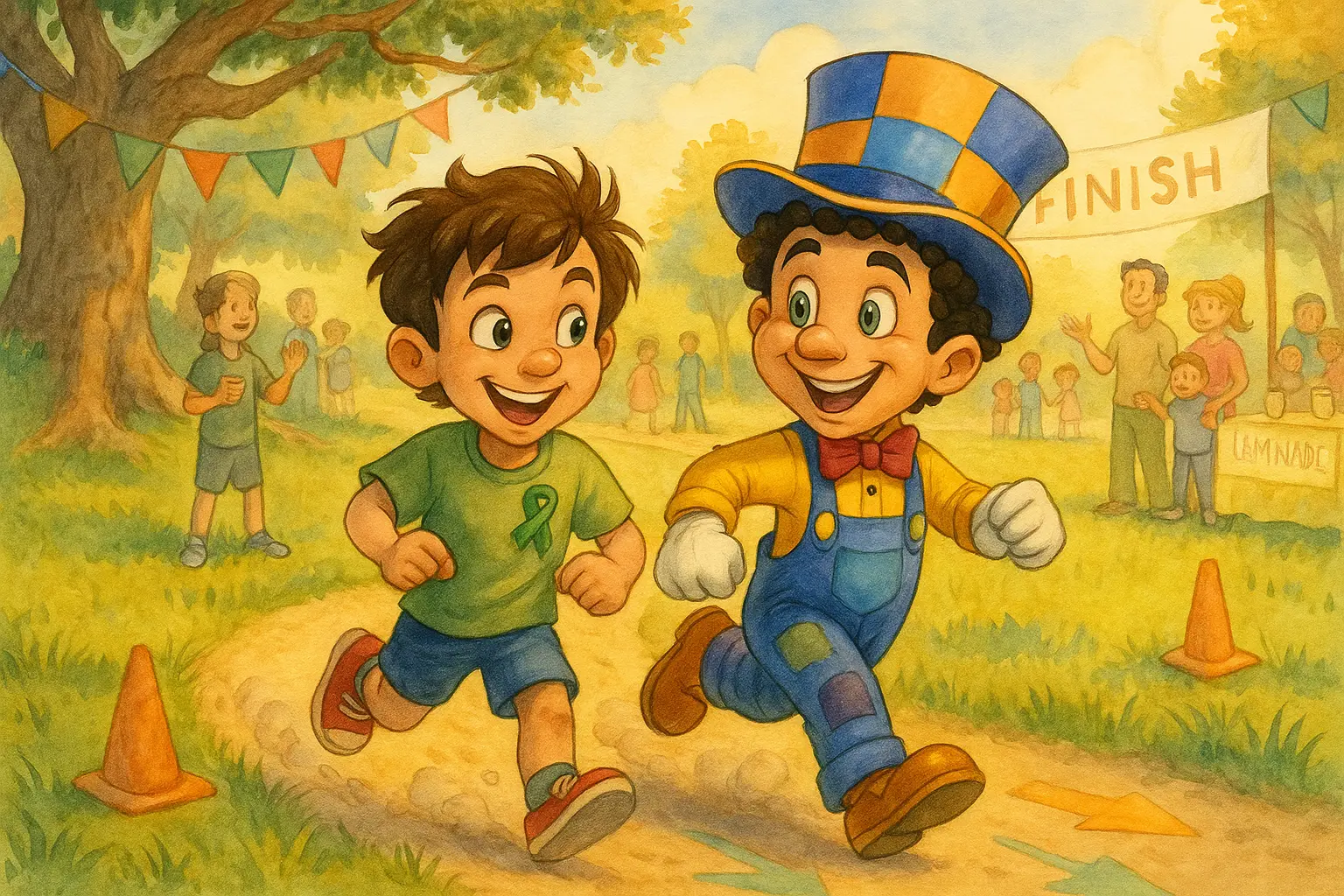When the town hears about National Running Day, it plans a one-mile race for Saturday.
All week, the park buzzes. Helpers set out orange cones. Kids chalk bright arrows on the path. A big white banner that says FINISH flutters over the last stretch. The arrows all point one way around the loop.
In this town lives a boy named Chester. He loves to win at anything—marbles, hopscotch, board games, races. He also loves shortcuts. Last week, he hid an extra marble in his sleeve. At hopscotch, he nudged the marker with his toe. During a card game, he peeked when no one was looking. People noticed. They started to call him “Chester the Cheater.” Chester didn’t like how that felt, but he still wanted to win.
There is another runner named Pockets. They call him Pockets because he always has room for a spare smile—and sometimes a snack. Pockets runs to have fun. He plays fair. He even laughs at himself when he trips or waves at the wrong time. His favorite words are, “All well, ends well.”
Saturday comes warm and bright. Music bounces through the park. Runners line up at the start. Chester shakes his legs and grins at the crowd. Pockets takes a deep breath and smiles at everyone, including himself.
The flag rises.
“On your mark… get set… go!”
Chester shoots forward. Pockets settles into a steady, easy pace.
In a flash, Chester scoops a handful of dirt and tosses it onto the path in front of Pockets’ feet. Pockets steps, slips—plop!—and lands in a soft puff of dust.
The crowd gasps. Pockets blinks and chuckles. “Whoops! The ground wanted a hug. All well, ends well.” He pops up, brushes off the dust, and jogs on.
Chester hears the laughter behind him and glances back. He laughs so hard at Pockets’ dusty shirt that he forgets to look ahead.
Bonk!
A low branch from the big oak taps his forehead. He stumbles, shakes it off, and takes off again.
But the bonk twists his sense of direction. Chester sprints the wrong way and charges back down the path he just ran. He waves to the same people again. “Wow, I’m so fast I’m seeing you twice!” he brags, zipping past the lemonade stand for the second time.
“Other way!” call the helpers, pointing down the course and at the chalk arrows. Chester doesn’t hear. He is too busy boasting about his speed.
Meanwhile, Pockets keeps his rhythm. Tap-tap, tap-tap go his shoes. He scoots aside to let an older runner pass. He sees a little kid sitting on the curb with a loose shoelace.
Pockets slows down. “Need a hand?” He kneels, ties a neat bow, and wiggles the loops like bunny ears. The kid laughs. Pockets laughs at himself too. “All well, ends well.” Then he runs on.
Up ahead, Chester bursts through cheering families and throws up his arms. He thinks he has reached the finish—but he is standing at the starting line again. The flag helper blinks. “Wrong way, friend. Turn around!”
Chester spins, confused. “But I already saw these people!” He finally sprints the right direction. He slips in a puddle. He bumps a cone. He is tired and tangled from all his zigzags.
As he passes the crooked cone, Chester stops. He sets it straight. “Forward,” he tells himself. Then he runs true.
Pockets rounds the last bend. The real FINISH banner shines in the sun. Streamers flap. People cheer. Pockets almost waves at the snack table by mistake, then giggles at himself. “All well, ends well!” With a happy hop, he crosses the line.
A little later, Chester huffs across, red-faced and grumpy with himself. He looks down at his shoes. He knows he lost—and he knows why.
Pockets walks over with a paper cup of lemonade. “You okay?” he asks.
Chester nods slowly. “I threw dirt. I laughed at you. Then the tree bonked me, and I ran the wrong way. I saw the same people twice because I was turned around. I thought winning mattered most.”
“Winning is nice,” Pockets says gently. “Races are for running, not tricks. Fair feels better—and it lasts.”
Chester takes a sip. The cold lemonade eases the lump in his throat. “I’m sorry, Pockets. No more tricks. Next time, I’ll run true.”
“Deal,” says Pockets, and they shake hands—sticky with lemonade and honest as a promise.
At the awards tent, the announcer smiles. “Today we cheer for fast feet—and fair hearts.” He pins a blue ribbon on Pockets that says FAIR PLAY. The crowd claps and whistles.
Then he turns to Chester. “We all make mistakes. What matters is learning from them.” He hands Chester a small green ribbon that says LESSON LEARNED. “No more ‘Cheater.’ Just Chester, who learned.”
Chester tucks it into his shirt like a new kind of courage. “See you at the next race,” he tells Pockets. “No cheating. Just running.”
“See you there,” says Pockets.
They jog a slow lap together—forward this time—waving at the people once, just once, the right way. The sun warms the path. The big oak stands quiet. The chalk arrows still point true.
Pockets looks up and smiles. “All well, ends well,” he says.
And this time, Chester smiles too, because now he understands.


